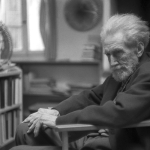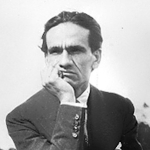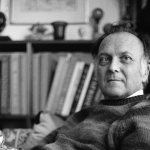At that time the sheep called to him
From their wormy bellies, as they
Lay bloating in the field. He was
A pastoralist,
The schoolhouse hardly handsize
In a sky of flax.
He began
Then to keep the sayings of man
(The left hand writing; the right hand
Crossing out) farming the time by day
With a great rake
And in the evening hearing myths
Of the hurricane and the tornado
(Straws driven through glass),
And of the waking in the grave
(The sharp hands of brothers buried
Together).
In the deep night the rat-
Traps in the seed room broke the rat's
Back, and the rat called to him in
The next room over in a penetrating
Eloquent way.
In the parlor it was
Always deep night where the separated
Organs of the living slept in jars
(The lank goiter and the rotted
Appendix) awaiting the end-time
When the emasculated ram will rise
In the flax-blue sky
(Cold as the final bluing of a Sunday wash)
And all of us will know
The use in beauty of the whole body.
In the hay field was the beginning
Of knowledge:
Sour wine, the great rake hoisted
Toward the high sun-altar of the stack
And the hoist rope hauled out hard
(Like a greased whip of which the stories
Told were of the severing of limbs)
By two staggering teams—and the whole
sun in its extreme tower of noon.
All he heard was violent and sad
But he kept on writing the sayings
Of man with his left hand, and sent
Them off in broken words, and waited
In the mortal field
Listening to the mice in the bottom
Of the stack.
Now though the schoolhouse
Hangs like a stone over the field
Robed in its winding sheet as blue as air,
The shepherd hand of eloquence still keeps
And flashes
Out the sayings of the man—
And the other (the right hand of
Obliterating habit) sleeps.



















Comment form: